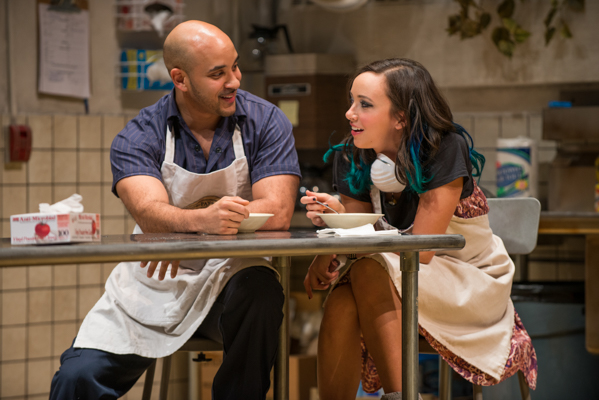Grand Concourse

(© Michael Brosilow)
From the title to the final scene, Heidi Schreck's Grand Concourse is a study in the dueling forces at war wherever humans strike up a society. Good versus evil, forgiveness versus stone-heartedness, virtue versus hedonism – they're all battling in the hearts and souls of the four characters in Schreck's intermissionless, single-set drama.
That summation might make it sound like the 105-minute Steppenwolf production, directed by Yasen Peyankov, is awash in predictable tropes. It isn't. Set in a Bronx soup kitchen, Grand Concourse has enough intrigue to keep audiences engaged. It avoids the well-trod narrative route where troubled souls find redemption and achieve peace by the closing scene. The (largely offstage) homeless of the Grand Concourse are described as a hopeless group at the beginning and remain so even at the final blackout. The people struggling to help them don't find redemption through their altruism. Schreck has penned a gripping, honest story that, while flawed in several respects, is both entertaining and thought-provoking.
Shreck takes her title from the Bronx boulevard built in the 1900s and modeled on the Champs-Élysées. The thoroughfare was supposed to bring Parisian-style beauty to the borough. Instead, the Grand Concourse neighborhood church soup kitchen, run by a nun named Shelley (Mariann Mayberry for most performances, understudy Shawna Franks the night I saw the show), is now in the middle of an ugly, poverty-stricken neighborhood.
Rising above the interior of scenic designer Joey Wade's meticulously detailed rendering of a basement industrial kitchen, scaffolding and dun-colored netting mute the church's massive stained-glass windows. The kitchen's prisonlike transom windows are repeatedly rattled by rock-throwing hoodlums. The sole spots of color in the kitchen – a statue of the Virgin Mary in Madonna blue, a picture of a glowing Jesus, and a bright orange basketball, do nothing to ameliorate their drab, fearsome surroundings.
Shelley has developed a tough hide over the years, and she carries on with a flinty determination almost strong enough to overpower the well of resigned despair that bubbles to the surface when she tries to pray. The other soup kitchen worker we see is Oscar (Victor Almanzar), a muscled teddy bear of a Dominican man who chops vegetables just as deftly as he deals with violent "guests." The dynamic of the kitchen is altered dramatically with the appearance of Emma (Brittany Uomoleale), a young woman who is transparently needy and enigmatically troubling. Emma claims volunteering will help her in the wake of getting kicked out of college and being diagnosed with cancer. Her brief time in the kitchen will forever change Oscar's and Shelley's lives.
Schreck's drama stumbles most noticeably with the underwritten Emma. From the start, it's obvious that Emma can't be trusted, and that her declaration of cancer is suspect. She's sick all right, but you'd have to be snoozing not to realize her illness is mental. With a faint nod toward All About Eve, Shreck creates a character who is a master manipulator and, quite possibly, evil. But she never really digs into how Emma became so damaged, or why she targets Shelley and Oscar for emotional destruction. Emma remains a frustrating mystery to the end.
There's also a credibility-defying plot development in the latter portion of the piece, when Shelley has to leave town for a few weeks. Given what the nun has learned about Emma, it defies belief that Shelley would leave the young woman in charge of the soup kitchen. When Shelley also hands over the keys to her apartment so that Emma can housesit, credibility isn't merely strained, it's shattered.
Still, Peyankov's cast delivers performances good enough to make you forgive the glaring improbabilities in Schreck's plot and her failure to make Emma more than a malevolent cipher. Shelley's journey is at the heart of the play and Frank's portrayal renders her intensely empathetic. When she makes a radically life-changing decision in the wake of Emma's final act of cruelty, the moment reverberates with authenticity. Almanzar does excellent work as the genial Oscar, depicting a guy who is both hard-as-nails and soft below the surface. However, he's no match for Emma's machinations, and it's wrenching to watch this mostly guileless good guy caught in a web of someone else's making. Uomoleale's Emma is engaging, but she simply doesn't have enough to work with and leaves you wishing for more. As a shaggy homeless man, Tim Hopper brings both comic relief and pathos. He's the only "guest" of the kitchen we see, but he embodies a world of unfortunates.
Costume designer Natasha Dukich subtly reflects Shelley and Emma's ever-changing relationship. At one point the women have almost exchanged looks, Emma ditching her skin-tight skinny jeans and showy top for loose-fitting, muted garb Shelley favors, while Shelley puts on a skirt and a subtly colorful blouse. Peyankov maintains a taut pace throughout Grand Concourse, and the performances he draws from his cast are memorable, even with the script's limitations.
You may leave hungry for more at the close of Grand Concourse. Shelley's story ends with a well-earned exclamation point. But Emma's, unfortunately, fades frustratingly away with a vague ellipsis.










